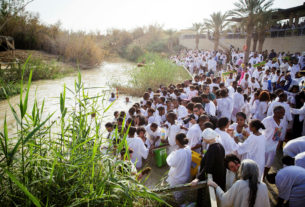Israeli public figures attempting to visit Jordan on Tuesday were ordered by Jordanian border officials to remove their Kippahs, religious head coverings, Tzizit and other Jewish markers before entering the Kingdom, generating a minor diplomatic incident.
Some of the group’s members, ultra-Orthodox deputy mayors, conformed with the demand while others refused to comply with the seemingly offensive and anti-Semitic demand.
‘);
_avp.push({ tagid: article_top_ad_tagid, alias: ‘/’, type: ‘banner’, zid: ThisAdID, pid: 16, onscroll: 0 });
Israeli Interior Minister Aryeh Deri, who was notified of the incident, spoke with Israeli Foreign Ministry officials and National Security Council head Meir Ben Shabbat, and the Israelis were subsequently allowed to enter Jordan without any restrictions.
Israeli Foreign Ministry officials notified their Jordanian counterparts that Deri was considering preventing Jordanian workers from entering Israel following the incident.
The Jordanians claimed they issued the ban to “ensure the safety of Israeli tourists.”
Following Deri’s threat, the Jordanians announced that they would once again review the directive to prevent Israeli tourists from entering the country while wearing Jewish markers and symbols.
This is not the first time Israelis traveling to Jordan have encountered hostility by the Kingdom’s officials.
The incident occurred just days after President Reuven Rivlin announced that following his meeting with Prince Ghazi bin Muhammed of Jordan, Mount Aaron will be reopened for visits by Israelis.
In August, Jordan had shut down the supposed biblical burial site of Aaron Hakohen after Jews visiting the site prayed there, an affront to the Muslims who believe the site is a mosque. Muslim elements in the kingdom called on the government to keep it closed to Jews.
While the exact location of Aaron’s grave is unknown, the Islamic tradition places it on Mount Hor, near Petra.
Jordanian media sites tied this incident to the broader struggle against Israel for the control of the Tempe Mount in Jerusalem.
In the Wednesday meeting, Rivlin asked the Jordanian official to instruct the authorities to continue allowing groups to visit the site after prior coordination and with on-site guides and security.
Israel’s diplomatic relations with Jordan have been tense for years, and especially after the Hashemite Kingdom announced it would withdraw from part of the peace agreement with Israel.
While Jordan officially remains committed to the peace agreement, relations are limited mostly to behind-the-scenes security ties and some cooperation on tourism and environmental issues.
The Jordanians overwhelmingly reject the peace agreement and any form of normalization with Israel.
‘);
_avp.push({ tagid: article_top_ad_tagid, alias: ‘/’, type: ‘banner’, zid: ThisAdID, pid: 16, onscroll: 10 });




